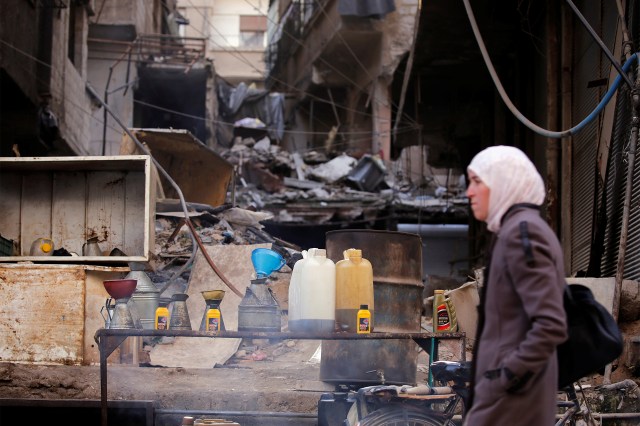“Death may be more merciful to us than what we live in.” Abu Ali often repeats this sentence, due to the difficulties and crises that he has experienced. After he was one of the most prominent food traders in Eastern Ghouta, he is now looking for work to secure his strength and his family.
The siege imposed by the regime of President Bashar Al-Assad on the eastern Ghouta when it was controlled by the opposition had a prominent role in the decline of Abu Ali's material ability, and then the bombing of his house and commercial stores, which resulted in their complete destruction.
After the military campaign in which the regime forces took control of the eastern Ghouta, Abu Ali, staying in it, influenced the displacement, so he met his wife, who was detained, but he discovered that she had a cancerous tumor, which increased the burden on him.
"I look heartily at my property, which has become cumulus and admired the situation that I never expected to reach," he said. "From a merchant to a daily wage worker and looking for financial assistance to secure my wife's medicine."
"The news of my wife leaving the regime's prisons for three years made me forget about my concerns, but the news of her cancer was the anvil blow that brought me back to the deepest point of suffering and loss."
Security campaigns
Eastern Ghouta is witnessing ongoing security campaigns from the branches of intelligence and the military police, with the aim of arresting young men and women who had a role in the opposition revolutionary movement, and most of them were transferred to Sednaya prison, which is known for its poor reputation, and which the residents say that those who enter it do not leave him alive.
The military police also joins the security and intelligence branches in their campaigns aiming to lead the youth to military service with both the obligatory and the reserve sides, and sent the youth to the fronts of the fighting, in addition to the security barriers prevalent in Ghouta and its vicinity, which increases the fear of the people to go to Damascus due to the many random arrests.
According to a source who declined to be named for security reasons, "the regime forces follow a precise policy in dividing the youth into categories, the first that was withdrawn for compulsory service and the second for the reserve service, and thus removed from it the obstacle of protests or any confrontations, and the region witnessed arrest campaigns almost daily."
Reality
The emptying of the regime forces to the Eastern Ghouta of its youth caused a great stalemate, as there is no longer an experienced workforce in the region that has long been famous for making wooden furniture and canned food. The agriculture has deteriorated mainly due to the prevention of the introduction of fertilizers and pesticides into the area on the pretext of preventing its use in the manufacture of explosives.
But the most prominent obstacle for all the people is the collapse of the value of the lira, which reached its lowest levels, and caused the price to rise several times, at a time when the regime forces are preventing any foreign currency dealings in their areas, which made the people go to buy gold with the money they possess, so they can preserve the value of their financial savings.
The accelerating collapse of the lira, and with the approaching implementation of the first package of US sanctions within the Caesar’s Law, has caused a significant increase in the prices of food, fuel and medicines.
Residents believe that the coming days will be difficult for the residents of the regime's control areas, and they fear that the impact of the sanctions will extend to the opposition's control areas.

